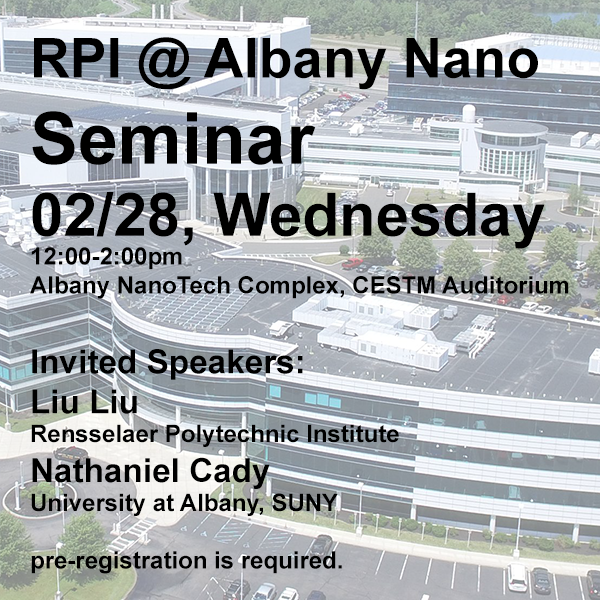
Greetings from RPI@Albany-Nano!
As you may know, RPI moved into the Albany NanoTech Complex recently to engage more directly with our partners in Microelectronics. We are organizing a series of events at our new location, starting with Spring Seminar Series.
We invite you to the RPI @ Albany Nano Spring Seminar Series, on February 28th, Wednesday, 12:00pm-2:00pm, at CESTM Auditorium (ANT). Registration is required for all attendees; non-US citizens must register before 02/15/24. See the registration form for more details.
Looking forward to meeting you.
RPI @ Albany Nano, Spring Seminar Series
28 February 2024, Wednesday,
12:00 pm – 2:00 pm*
Albany NanoTech Complex, CESTM Auditorium**
“Scalable AI Computing through Elastic Algorithm-Architecture Co-Design”
Liu Liu, Rensselaer Polytechnic Institute
“Lab-to-Fab Pipeline for New Memory Materials and Devices”
Nathaniel Cady, University at Albany, SUNY
In-person seminar, registration required.
Scalable AI Computing through Elastic Algorithm-Architecture Co-Design
Liu Liu, Rensselaer Polytechnic Institute
Abstract: The current AI computing landscape is encountering a scalability crisis. Innovations across various domains are being driven by large-scale AI/ML advancements, notably foundation models and large language models, all powered by the computing capabilities in processor technology as per Moore's Law. Despite this progress, the insatiable demand for computational resources by large-scale AI poses significant challenges in maintaining performance and energy efficiency in a cost-effective manner. This talk focuses on addressing these scalability issues in AI/ML by examining the concept of elasticity in both ML algorithms and hardware architectures. It will explore dynamic connectivity-based methods for Deep Neural Network (DNN) training, inference, large-scale classification, and long-range Transformers from an algorithmic standpoint. From the hardware perspective, the discussion will cover architectural support, emphasizing balanced, specialized, and adaptable designs to enhance efficiency.
Speaker Biography: Dr. Liu Liu is an Assistant Professor in the Department of Electrical, Computer, and Systems Engineering and the Department of Computer Science at Rensselaer Polytechnic Institute (RPI). He holds a Ph.D. in Computer Science and an M.S. in Electrical and Computer Engineering from the University of California, Santa Barbara. At RPI, he directs the Efficient, Parallel, and Intelligent Computing (EPIC) Lab, focusing on the design of elastic AI computing systems and architecture, with multiple industry-funded collaborations. He is a recipient of the Peter J Frenkel Fellowship from the Institute of Energy Efficiency at UCSB and the 2023 Samsung Global Collaboration program.
Lab-to-Fab Pipeline for New Memory Materials and Devices
Nathaniel Cady, University at Albany, SUNY
Abstract: As an academic researchers, most of our discoveries begin in the laboratory and rarely transition to a manufacturing environment. The Albany Nanotech Complex provides a unique environment for bringing early stage material and device discoveries into a pre-manufacturing environment, using an industry-standard 300mm processing environment. In this presentation I will describe my research group’s journey through early-stage material and device development efforts and how we have transitioned these technologies to integration with CMOS at the 300mm wafer level. Specific examples will include our work on resistive random access memory and multiple biosensor technologies.
Speaker Biography: Prof. Cady earned his BA and Ph.D. from Cornell University in Ithaca, NY and is currently an Empire Innovation Professor of Nanobioscience and Associate Dean for Research in the College of Nanoscale Science & Engineering at SUNY Polytechnic Institute. Prof. Cady has active research interests in the development of novel biosensor technologies and biology-inspired nanoelectronics, including novel hardware for neuromorphic computing. He is also the executive director of the SUNY Applied Materials Research Institute (SAMRI) that funds collaborative research efforts between SUNY faculty and industry partner Applied Materials (AMAT). He has published over 150 peer reviewed scientific papers and is an inventor on 11 patents. His research has been supported by the NIH, NSF, AFRL, ARL, DOE, ONR, SRC, as well as multiple industry partners.
In-person seminar, registration required.
* Refreshments / light lunch will be provided before the seminar.
** Access to ANT.
All individuals must bring a valid government issued photo ID (State Driver’s License or State non-Driver’s License ID) or Passport. For non-US citizens with permanent resident status, please bring your US Green Card. RSVP is required by February 23rd.
All non-US citizens must present their Passports (and a valid government-issued photo ID) at the security check-in. Only the non-US citizens who have received the background clearance will be admitted to the site. Their RSVP is required by February 15th for background clearance.
